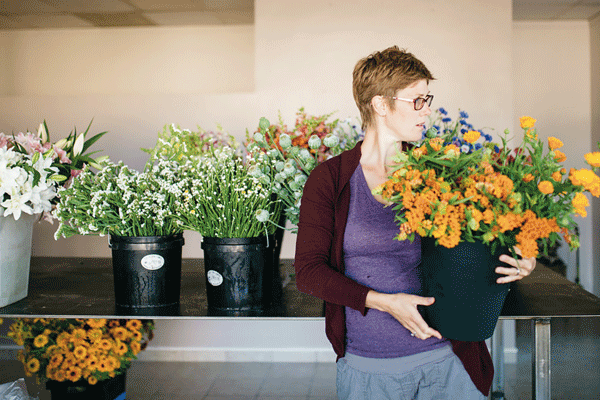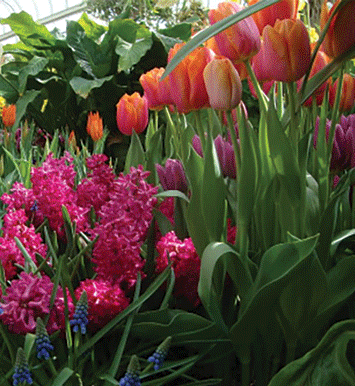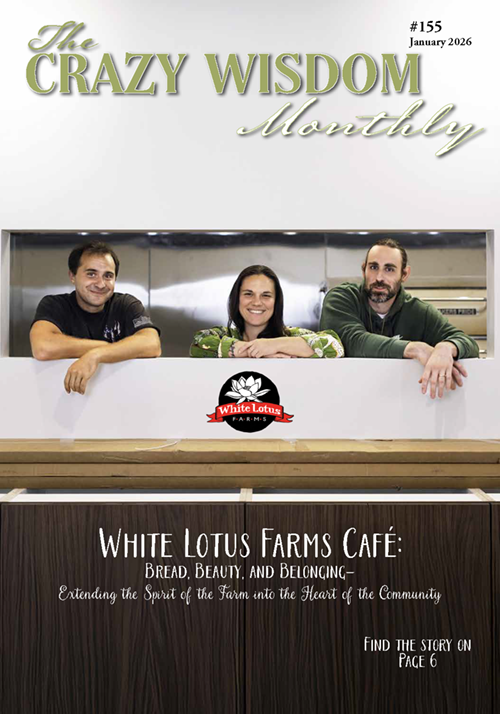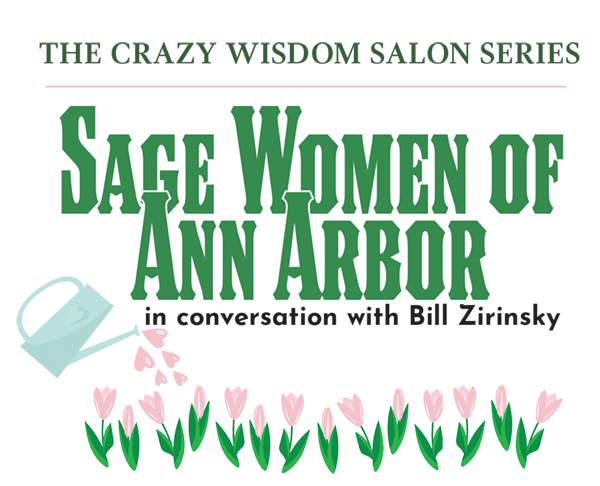Market manager Amanda Maurmann sorts flower buckets before the start of market.
By Chelsea Hohn, Photos by Cat Carty Buswell
In the middle of the growing season in 2017, something brand new sprouted in Ann Arbor. Grown with care, the Michigan Flower Growers’ Cooperative was founded on July 5, 2017, and ran through the rest of the growing season with great success. Now, they’re approaching their second year of bringing locally-sourced flowers to southeast Michigan, serving everyone from local flower shops to DIY brides to individual consumers with beautiful blooms.
The goal was fairly simple: connect local growers to buyers, easing the logistics between both parties and bringing more business to local growers by increasing the availability of local flowers. The idea for the cooperative came from Amanda Maurmann, who owns a flower growing business called Gnome Grown Flower Farm, and Alex Cacciari of Seeley Farm. Their initial conversation was in no other place than in the field; their ideas were passed back and forth as they harvested. They knew they wanted to connect local growers to florists and designers, but their idea needed structure. Once they found the Seattle Wholesale Grower’s Market Cooperative, they had a model to work off of. They then brought on Trilby Becker of Sunseed Farm. Both women already owned their own businesses and wanted an extra set of hands to help get the co-op off the ground, as well as another opinion and voice as things came together. Becker, who also owns her own business, became the third member of the team.
“The goal was fairly simple: connect local growers to buyers, easing the logistics between both parties and bringing more business to local growers by increasing the availability of local flowers.”
It’s no surprise that the local food movement is important to southeast Michigan. In Ann Arbor alone, the farmers’ market is robust year-round, and stores like Argus Farm Stop have made local food even more appealing and convenient. This mindset is growing past food and into flowers.
Typically, if a farmer wants to sell flowers to a wholesale buyer, there’s lots of back-and-forth conversation, logistics coordinating, and timing to work through. The Flower Growers’ Cooperative takes the logistics away from individual farmers and allows for one point of reference. Growers buy into the co-op and bring in what they choose on a weekly basis, and buyers either purchase a season pass to shop the market all year, or there are day passes available for brides and anyone else looking to buy flowers for a special event. Instead of communicating with 10+ farms, a buyer comes to one market and buys from those 10 farms. This makes it easier for local florists to get local flowers to the public, as well.
Last year, the co-op held a one-day open house for the public at Passionflower, a floral design studio in Ann Arbor. Visitors were greeted with buckets teeming with color, huge showy blooms, delicate foliage, and an array of scents overwhelming the senses. Huge blush-colored dahlia blooms stood waiting in buckets next to cheerful sunflowers, while windy grasses and greenery tucked themselves into the mix. Buckets were labeled by each grower, and the line to buy flowers kept growing. Cacciari and Maurmann have gotten feedback from more people who want to be able to access the market. There’s a growing interest in local floral design, and the co-op is making it much easier to find great choices.
The co-op also appeals to small-scale growers and those just starting out, as well as established farms. Many growers face the challenge of volume. They may have a premium product but not enough of it to sell to florists, who may require lots of one type of flower. The co-op makes it convenient for smaller growers to bring what they have and allow a florist to add flowers to their picks for the week.
In their inaugural year, the co-op had 13 growers, including larger well-known local names like Goetz Farm, Green Things Farm, and Seeley Farm — but also smaller farms that may be just starting out, or just reaching into different markets, like Lindsay Daschner of Forget Me Not Farms.
“Visitors were greeted with buckets teeming with color, huge showy blooms, delicate foliage, and an array of scents overwhelming the senses. Huge blush-colored dahlia blooms stood waiting in buckets next to cheerful sunflowers, while windy grasses and greenery tucked themselves into the mix.”
“The co-op has been super awesome and has allowed me to branch out and be in the Ann Arbor market,” Daschner said. Forget Me Not Farms is located about 40 miles south of Ann Arbor in Ottawa Lake. In addition to being helpful to expand her market, the co-op has given her a safety net to take risks in growing and has helped her find an entirely new community to be a part of.
Since the co-op started last year in the middle of the growing season, most members brought what they had already been growing. Now, members like Daschner are planning ahead. “I’ve doubled my dahlia order for this year,” she said.
Now, members can plan to have additional inventory for buyers. It also allows growers to experiment, to take risks with smaller volumes of more interesting flowers — most of which did really well last year, explained Cacciari. Much of floral design is heading towards a less traditional look: things like seed pods, woody branches, tomato vines, and vegetables are making it into arrangements — and into the co-op. The Flower Growers’ Co-op allows growers to take risks with materials that may be considered “strange” without as much fear of not selling. This also means that buyers can work directly with the co-op if they know they have a wedding coming up, and growers can plan accordingly.
Professional buyers were extremely happy with the co-op last year, according to Danielle Vignos, owner of University Flower Shop. Vignos explained that working with the co-op allowed her a convenient way to work with local growers and support an ever-expanding market of local flower growers. Being a small business owner, supporting other local businesses is important to her. Plus, the product that she receives from local growers is premium. The blooms are better, the stems are stronger, and overall it’s a much better product to work with.
“Now, members can plan to have additional inventory for buyers. It also allows growers to experiment, to take risks with smaller volumes of more interesting flowers.”
Vignos explained that the co-op has an easy online ordering system, which makes planning ahead for weddings and retail, both of which University Flower Shop does, very convenient. And, instead of there being competition, there’s a strong sense of “we’re all in this together.” Even buyers like Vignos share the excitement around supporting several local growers.
“It makes our job even more fulfilling,” she said. “It’s so cool when you know the person spending the time growing and then you get their product. It’s a special interaction. That exchange is super powerful, and it’s amazing.”
Cacciari explained that having that much product together was actually quite beneficial. She said that she could send her inventory list to a florist or wholesale buyer, “But it’s more appealing for a buyer to go to one place at the same time and get stuff from me and from 12 other growers, as well.” This spreads the wealth across several growers.
“There’s a sense of camaraderie,” says Daschner. “We’re all on the same side growing things, and everyone wants everyone to succeed.” Luckily, there’s a market for them all to succeed.
Brides want to support local farms in their wedding designs, and local events are beginning to utilize the bounty of locally grown flowers, as well. Cacciari said that this has taken a bit of education, teaching customers and florists about what is in season throughout the year, as well as showcasing the wide variety of flowers that can be grown in Michigan. This information can lead to a greater appreciation of what we have available to us, what is in season now, and a better understanding of our landscape as a whole. Vignos finds that there’s still a gap, though. People buying local food understand the benefits, but buying local flowers has yet to become as popular as local food.
“There’s a sense of camaraderie. We’re all on the same side growing things, and everyone wants everyone to succeed.”
The Michigan Flowers Growers’ Co-Op is a beautiful working and breathing example of a community that is making local work, and putting it first. It’s been highly impactful for the growers and given convenience to buyers. Founders have high hopes for the future: growth is on the menu, and they already have customers in Detroit asking for a second location. For now, they’re tending to what they’ve just begun to grow and paving the way for a strong future of local blooms in Michigan.
For more information visit their website miflowercoop.com or
email info@miflowercoop.com.









































































































































































































It was a passion flower that first stopped Susan McLeary in her tracks. The exotic flower ignited her passion and initiated her purpose toward becoming a florist, a designer, an artist, and an author. Yet, educator is the title Susan McLeary identifies with most these days.